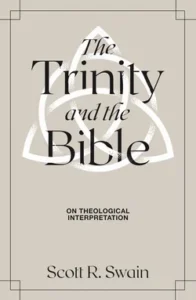
The Bible in the Trinity
We cannot fully appreciate how “the Trinity is in the Bible” without observing how “the Bible is in the Trinity.” While the Bible is the cognitive principle of the Trinity, the supreme source from which our knowledge of the Trinity is drawn, the Trinity is the ontological principle of the Bible. T he Trinity is not simply one of the things about which the Bible speaks. The Trinity is the speaker from whom the Bible and all things proceed: “For us there is one God, the Father, from whom are all things … and one Lord, Jesus Christ, through whom are all things” (1 Cor 8:6). All things in heaven and on earth, including holy Scripture, are ‘produced by the creative breath of the Almighty’ (See Ps 33:6. 2 Tim 3:16).
he Trinity is not simply one of the things about which the Bible speaks. The Trinity is the speaker from whom the Bible and all things proceed: “For us there is one God, the Father, from whom are all things … and one Lord, Jesus Christ, through whom are all things” (1 Cor 8:6). All things in heaven and on earth, including holy Scripture, are ‘produced by the creative breath of the Almighty’ (See Ps 33:6. 2 Tim 3:16).
Recent work on Scripture and hermeneutics rightly locates the Bible and its interpretation within a Trinitarian economy of revelation. According to the late John Webster, “prudent theology will treat questions concerning the nature and interpretation of Scripture … as corollaries of more primary theological teaching about the relation of God and creatures.” The Trinity is not simply one of the things about which the Bible speaks. The Trinity is the speaker from whom the Bible and all things proceed. Share on XAdopting this approach leads us to see “Holy Scripture and its interpretation” as “elements in the domain of the Word of God” a domain whose source and scope are Trinitarian in nature. “In fulfilment of the eternal purpose of God the Father (Eph. 1.9, 11), and by sending the Spirit of wisdom and revelation (Eph. 1.17), the Son sheds abroad the knowledge of himself and of all things in himself.” Kevin Vanhoozer and Dan Treier agree. Viewing the Bible within the domain of the Word enables us to perceive its nature as “a text that is authored (ultimately) by God, with God (Jesus Christ) as its ultimate content, and with God (Holy Spirit) as its ultimate interpreter.” Viewing the Bible within the domain of the Word also enables us to perceive its purpose as “part of a divinely administered economy of light by which the triune God establishes and administers covenantal relations with its readers” “Scripture is a means of God’s self-presentation.”The Bible is the product of the Triune God through which he (mysteriously) adumbrates and attests his self-presentation to his people. Share on X
Fred Sanders’s book The Triune God demonstrates the hermeneutical payoff of adopting this standpoint. Sanders draws on G. K. Beale and Benjamin Gladd’s work on the biblical theology of “mystery” to anchor his understanding of the Trinitarian economy of revelation. Attending to the mysterious shape of biblical revelation, he argues that “the Trinity is … a mystery in the New Testament sense of the term: something always true, long concealed, and now revealed.” More specifically, the full revelation of the Triune God comes by means of the personal presence of the Son and the Spirit in their respective missions: “In order to inform us that the Father has a Son and a Holy Spirit, the Father sent the Son and the Holy Spirit in person.” The Old Testament adumbrates this revelation of the Trinity, “shadowing forth” the revelation of the Trinity before the Son and the Spirit appeared in person to save and to sanctify us, while the New Testament attests it, bearing witness to the revelation of the Trinity after those saving and sanctifying appearances. Sanders’s work not only opens up promising possibilities for responsible Trinitarian exegesis of the Old and New Testaments but also offers an intriguing account of the unity of the Old and New Testaments. For Sanders, the Trinitarian economy of salvation “binds the two testaments together as one canon… whose center of attention is the oikonomia (Eph 1:10) but whose horizon includes the eternal being of God above history.”
The Bible is the product of the Triune God through which he (mysteriously) adumbrates and attests his self-presentation to his people. This, in part, is what it means to affirm that the Bible is in the Trinity.
The above excerpt is from The Trinity and the Bible: On Theological Interpretation by Scott R. Swain. Lexham Academic, 2021. Used by Permission.

